Filming During Covid Gives Prized Outlet to Quad-Cities Creatives
Saturday in the Arts is a comprehensive, in-depth feature on a topic, trend or personality impacting the Quad-Cities, posted every Saturday morning on QuadCities.com.
The day before the state of Illinois entered Phase 4 of reopening, affecting his longtime acting home of Circa ’21 Dinner Playhouse, Moline’s Tom Walljasper was filming scenes as a farmer in small-town Iowa.
 A full-time actor, Walljasper had not acted since “Kinky Boots” closed at Circa in March, and both he and his wife Shelley were cast in small parts for a TV pilot, “Complete Bull,” filmed in June and July (with many Quad-Cities actors) in Dubuque and smaller towns across rural northeast Iowa. Tom shot his scenes June 25, before Illinois limited indoor theaters to reopening with 50-percent capacity or 50 patrons, whichever is lesser – forcing Circa to remain closed until this fall, when it will stage a four-person comedy.
A full-time actor, Walljasper had not acted since “Kinky Boots” closed at Circa in March, and both he and his wife Shelley were cast in small parts for a TV pilot, “Complete Bull,” filmed in June and July (with many Quad-Cities actors) in Dubuque and smaller towns across rural northeast Iowa. Tom shot his scenes June 25, before Illinois limited indoor theaters to reopening with 50-percent capacity or 50 patrons, whichever is lesser – forcing Circa to remain closed until this fall, when it will stage a four-person comedy.
“I’ve been an actor for so long, Shelley and I really learned to manage when we don’t have a gig,” Tom said recently, noting he’s gone four or five months without a job. “You learn as an artist, you can’t be extravagant in your spending. You have to be smart.”
In addition to appearing in 98 stage shows at the Rock Island dinner theater, Walljasper has some films, commercials and voice-overs on his resume, including as an early 20th-century doctor in “Unintended,” the limited series Iowa filmmaker Colleen Bradford Krantz did just before “Complete Bull.” In June, the new pilot was among just a dozen Screen Actors Guild (SAG) productions allowed to film nationwide, during the Covid-19 pandemic.
Another small feature film is currently being shot in the Quad-Cities by Ian Klink, a Q-C native who teaches in Delaware. It’s also giving work to hungry local actors, long sidelined by Covid.
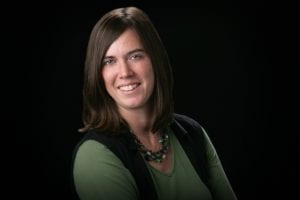
Colleen Bradford Krantz is a former journalist.
“She’s great, awesome,” Walljasper said of Krantz, a 47-year-old former newspaper reporter who lives in Adel, west of Des Moines. “She does great work. Just being from a smaller town in Iowa, she’s exactly how you would think a lovely, Midwest person in entertainment would be.”
In the planned hour-long pilot for “Complete Bull,” Lainey Dwyer (Chicago actress Hannah Ruwe) reluctantly enters the male-dominated world of livestock insemination when her “real” life hits the skids. But when her father suffers a massive heart attack, she must decide if she will escape back into her familiar past, or assume the shit-kicking role of a high-stakes, cattle insemination mogul.
“I’ll take what I can get,” Walljasper said of filming on farms in Elkader and Monona. “I’d never been to that area of Iowa. It was beautiful. I felt safe; I had a great time.”
Krantz worked closely with SAG and the Clayton County Public Health Department to ensure health and safety was a paramount picture. “She made everything so safe on set,” Walljasper said. “They cut down the number of people, changed scenes at a bar so they could accommodate not having extras.” His wife (also a Circa vet) was in a nighttime bar scene in Dubuque.
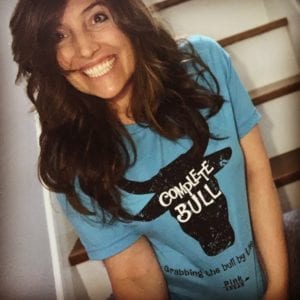
Kim Furness shows off a “Complete Bull” T-shirt.
“Can we do it safely? Which meant we had to change some scenes and cut others that we didn’t feel we could do, guaranteeing as much safety,” Krantz said recently. “For a while, there was a question, ‘Are we going to lose this, because we can’t do it safely?’”
There were a couple scenes in two bars, which she ended up combining, since they couldn’t film with a large crowd. “Instead, the bar scene is a more quiet setting,” Krantz said. “It’s not as much of a dance place as we pictured originally. It’s a different type feel than we would have done if Covid hadn’t come along, but I think it accomplished the same point.”
Another scene, if an actor was going to be close, they changed the distance between the actors. They had fewer crew members than normal, since at the time there was 10-person limit for gatherings on the set.
When the state dropped that limit, they could add a few more, but she tried to stay at 15 or fewer on set at one time. Most of the shooting (it’s 95 percent done) was outdoors, or in a barn that was open air, Krantz said.
“That was part of us getting approved, as well as having a small team. We also were shooting outdoors in an area that had 1.8 cases per 1,000 at the time,” she said.
A “Greenlight Grant” from the state
“Complete Bull” will be Krantz’s fourth major production and first fictional piece. Last summer, she was awarded a $30,000 grant from the Iowa Department of Cultural Affairs, which required a $1-for-$1 match. Krantz raised that, over four months, mainly with an online Kickstarter campaign.
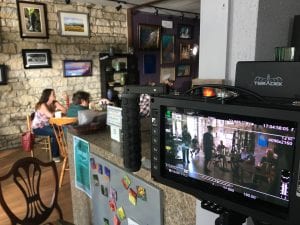
On the set for the TV pilot for “Complete Bull.”
“What I really liked about Colleen’s project is that it was authentic. I knew Colleen had grown up in the cattle industry here in Iowa, and that she works on the successful ‘Market to Market’ agricultural show on IPTV,” Produce Iowa executive producer Liz Gilman said in a piece last September at adelnews.com. “It’s great to see an Iowan share their story. And, I was also glad to see a female filmmaker rise to the top.”
The new Greenlight Grants can range anywhere from $10,000 to $50,000 and work to support homegrown Iowa stories. None of the grant or matching funds can be used to pay for production or post-production costs outside of the state of Iowa.
“Content is in huge demand from corporations like Netflix, Apple, Amazon and so forth,” Gilman said. “It would be amazing to see a story about a woman who lives in Iowa in the modern era of agriculture become incorporated on one of these platforms for the world to see.”
Krantz said hers was among only four productions awarded a grant out of 349 requests.
“I was really surprised to get it, and extremely happy of course,” she said. “It did mean finishing the third episode of ‘Unintended’ quickly and moving to this project so that I didn’t miss that window for the grant.”
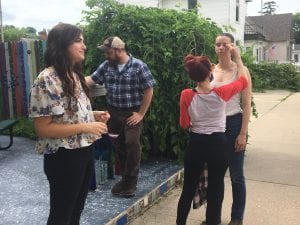
Liz Coin (left), formerly of the Quad-Cities, now living in Chicago; John Victor Allen, a lead actor from Chicago, Britni Farber, hair/makeup department head from Dubuque, and Hannah Ruwe, lead actress, from Chicago.
They gave her an extension beyond a year to use the funds (which were to expire in June), due to Covid.
“Unintended: Unlocking a Nation’s Pregnancy Secrets” is a three-part, true-story miniseries looking at how society reacted to unplanned pregnancies a century ago. They are available, in pay-per-view format, at https://vimeo.com/ondemand/unintended.
Covid knocked Krantz’s plans for that off course as well. She had been accepted into the Miami Web Fest, the Cedar Rapids Independent Film Festival and was waiting to hear on others, all of which would have the first public screenings of the first of three episodes. Those have been canceled or postponed. Since life is giving us lemons, Krantz decided to make lemonade, she wrote on her blog at pinkspear.com.
“We are considering catching Americans while they are stuck at home,” she said, resulting in the Vimeo release.
“Originally, I was disappointed the film festivals got canceled, but we’ve really had strong viewership on Vimeo, even though it’s a streaming platform most people don’t use yet, it’s still done really well, because people are home and they’re willing to take time to seek it out,” Krantz said recently.
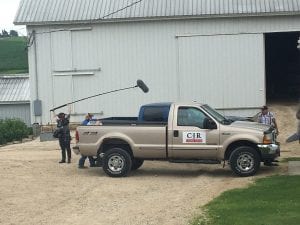
John Victor Allen (in blue) and Phil McKinley (in plaid), who’s a widely-known Broadway director.
“I hope that works also for ‘Complete Bull’,” she said, noting it’s a drama with comedic elements. “Anyone that grows up in a small town, knows the Midwest and Midwest people, will really feel like this is realistic to their world. They’ll recognize their lives more than they usually would in products coming from Hollywood, for example. Especially when it deals with livestock – I grew up with it and I know how to tell those stories in a way that’s realistic.”
From journalism to video storytelling
Krantz grew up on a cattle ranch in Guthrie County, Iowa (her parents both were raised on farms), and studied journalism at Iowa State University. She wrote for newspapers in Milwaukee, St. Louis and Des Moines (leaving the Register in 2005), before writing a book and partnering with Davenport documentary filmmaker Paul Kakert.
She wrote and co-produced the award-winning TV documentary, “Train to Nowhere; Inside an Immigrant Death Investigation,” nominated in 2011 for a regional Emmy award. Her non-fiction book of the same name (Ice Cube Press, 2011) was the starting point for the film. The book was named as a finalist by USA Book News in “Best Books 2011” non-fiction multicultural category.
Kakert, the film director and president of Storytellers International, was recommended by the Iowa Film Office to Krantz. While she thought the book would come first, she had trouble finding a publisher, and wanted to make the documentary.
“I started out working on the book first; I always liked the print format, and hadn’t thought about switching to video or film until I started looking at that story, as I researched it, about the immigrants who died in the rail car and were found in Denison,” she said of the 2002 incident documented in “Train to Nowhere.” “It felt like it had all the elements you need in a good documentary.”
“That was kind of looking for another outlet for this story I researched so much, but I ended up liking telling stories in the video format more than I expected,” Krantz said. “So I’ve continued on that path.”
Kakert was a producer on “Unintended,” and is an editor for “Complete Bull.” “I really like working with him,” Krantz said. This time she’s the showrunner and creator, and hired a director, Barry Andersson.
She also directed and co-produced the independent documentary “West by Orphan Train,” which won a regional Emmy in 2015.
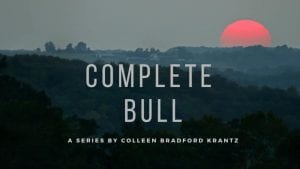
The logo for “Complete Bull”
Directing wasn’t the path she sought, since she enjoys the writing and storytelling the most. “Unintended” is a factual docudrama, including dialogue created for reenactments, and Krantz plans to market it to other streaming services.
In 2016, she named her production company Pink Spear Productions – billed as addressing “some of today’s most difficult topics, but we do so in a compassionate, thoughtful way. Many films today spoon-feed viewers with a grand final conclusion as to what point-of-view is ‘right,’ her site says. “Pink Spear Productions believes that our job is only to tell stories, as fully and accurately as possible, while including honest representations of various viewpoints. The job of those watching is to walk away to decide for themselves what to do with what they have learned.”
Women now represent three-quarters of college students in animal science nationwide, she said, which makes “Complete Bull” timely. “There’s interest among women to be involved with animals in some way or another,” Krantz said.
“Instead of being a vet or vet assistant, they’re going to be working in agriculture someday,” she said. “From my different journalism work, I’ve heard stories of how good it is for the confidence of young women that they can handle a 500-pound steer just as well as a kitten, you know? I love the idea of giving this story to women who are intrigued by the idea of entering this world, maybe not sure they can do it.”
A Q-C casting director, nationwide interest
Kakert recommended a Q-C casting director to Krantz — Kim Kurtenbach Furness, a veteran actress who filled that role in recent years for Moline-based Fourth Wall Films’ “Sons & Daughters of Thunder,” a true-life 2019 docudrama, and “Good Earth,” a 2017 documentary about Native American tribes four centuries ago.
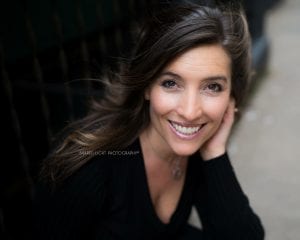
Furness served as casting director.
“This whole thing has been such a remarkable experience and such a great opportunity for so many of us!” Furness posted about “Complete Bull” on Facebook. “It feeds my soul to tell stories.”
“Because I’ve been an actor since I was 19, and I’ve worked with so many theaters, I just know everybody,” she said recently of getting into casting. “Local production houses would sometimes reach out to me and ask me, do I know anybody for a certain project they were working on.”
“I’m primarily an actor first and an acting coach,” Furness said. “As a casting director, that really lends itself to it, because I know what it’s like to be an actor and I know what they’re looking for, to tell the story. That’s been really fun, delving into this new career of casting.”
For “Complete Bull,” she reached out to cast nationwide, including actors from New York, Chicago, Los Angeles, Wisconsin and Ohio. “It was by far the biggest radius of searching than I had ever done before,” she said, noting they cast for over 60 roles (more than 15 filled by Q-C actors, or those with local roots).
“What I love about casting and this process in particular, it wasn’t just me; my job is to go and find talent,” Furness said. “It would be me and Colleen and Barry narrowing it down, finding who we liked.”
“What has been so fun about it, and so different about casting a TV show as opposed to a movie or theatrical production – with a movie or theatrical production, the story ends after two hours,” she said. “With a TV pilot, you’re starting a story. It’s a story that could go on 10 years.”
After Furness read the script, she thought, “This is not just good; this is great. It was an excellent script, and I’ve read a lot of screenplays.”
“It’s very good, and it’s telling a story – there aren’t a lot of TV shows about cattle insemination,” she said. “It’s a story about Iowa and the Midwest, what it’s like to live here and grow up here. There’s an element to that, I connected with, being an Iowa girl.”
“Her script was so great because they didn’t stereotype them.” Furness said of the Iowa characters. “Sometimes, when you see Midwest characters, they’re portrayed as the not-very-smart farmer or the hillbilly, or whatever. I just liked it was real people with real stories. Also, the fact that there’s not a lot out there right now, so I think we’ve got a good shot at least being looked at, simply because not many people are being able to produce stuff now. It is starting back up again. We kind of have that in our favor.”
Among actors who don’t currently live here but have Q-C ties were Phil McKinley, a Broadway director and 1973 Augustana alum; Keenan Odenkirk, nephew of Bob Odenkirk and a 2018 Augie grad; and Liz Coin, a Pleasant Valley High alum. Bruce Bales, the director of photography, is a 2004 Bettendorf High grad.
Phil McKinley, he was a blast,” Furness said, noting after a decade in the Q-C had moved to Palm Springs, Calif. “I knew he had a lot of experience with animals. A lot of the actors had to be comfortable being around cattle, on a farm.”

Kim Furness shows off a “Complete Bull” T-shirt.
“One of the things that was so amazing, this was a Screen Actors Guild project, and almost all production had been shut down,” she said. “They finally started to allow; we were afraid we’d have to postpone everything. We had all these actors ready to go. So when we finally got the green light, we were so incredibly blessed.”
“We were one of the first ones, and I think it was due to the fact that – a) we were filing in the middle Iowa, not exactly a hot spot for Covid cases, but also our particular pilot, most of the scenes, a lot of them took place outdoors, so it was easier.”
“What was hardest for me, I had put five months into meeting with all of these actors and holding auditions, callbacks, most all of it on Zoom, and when you get to know all of them, when the filming started, I couldn’t be there on set because they could only have so many people,” Furness said. “Casting director is not an essential person to have on set.”
“What I’m loving the most about being a casting director is, the casting director is very much part of telling the story,” she said. “They’re the ones that find the talent, who play the characters who tell the story. It was much more artistically fulfilling than I thought it would be.”
For many out-of-work actors, “it provides more opportunity for work,” Furness said. “Not just from the Quad-Cities, but we got a lot of actors from Des Moines, Cedar Rapids, northeast Iowa, and so it’s been really fun to be able to just open up opportunity like that for a lot of my friends, people that I know, and new people I got to meet through this process.”
Roping in a familiar role
Shane Partlow, a native of Taylor Ridge, Ill., who grew up on a horse farm, lives in Baton Rouge, La., and auditioned last fall while visiting his parents. Since March, he had two other acting jobs that were canceled or postponed, and was happy to get the TV pilot, also playing a farm owner.
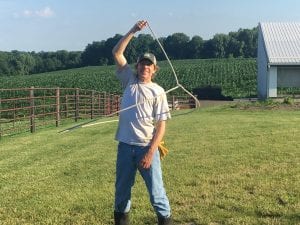
Shane Partlow twirls a rope on a farm near Colesburg, Iowa.
“I was saying to Colleen, this timing is incredible, you got lightning in a bottle,” he said recently. “From the very beginning, I thought there was something very special about this project; I knew I was supposed to be involved in this.”
Partlow – who had a key scene in the Oscar-winning 2018 film “Green Book” — got his SAG card twirling a big rope for a Cover Girl TV commercial in Manhattan in 1994, and his Equity card in a ’93 Chicago production of “Will Rogers Follies,” also doing roping.
Filming “Complete Bull,” with cows in a barn, “it was very surreal,” he said. “I felt very safe the whole time. Everyone had masks on; they did temperature checks. I didn’t have a problem. God bless the crew that had to wear masks the whole time. It was top notch from the top down.”
“It was a great experience. In the midst of being things being closed, how lucky am I being able to do what I do?” Partlow said. “During a pandemic in 2020, I was very lucky and blessed I got to do it. I’m very grateful for every opportunity, you never take it for granted.”
Improvising a film shoot
Ian Klink — teacher of digital media design and film and video production at a charter high school in Middletown, Del. – is in the midst of shooting a small feature film in the Q-C called “Any Woman’s Blues.” It’s about the breakup of a relationship between two actors, and their theater director, featuring Jessica Taylor and Justin Marxen as the couple, Tristan Tapscott as the director, and Luke Oberhaus.
“It’s a pretty cool concept for the film, as the film only features an outline and all the dialogue is improvised, which has provided a lot of freedom and challenges,” Tapscott, a Circa veteran, said.
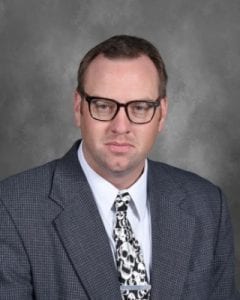
Ian Klink, a Q-C native, is a teacher in Delaware.
“Ian’s film is a really interesting experiment,” he said. “It’s raw and visceral and the reactions are as real as they can get. It’s been wild to work on something and been a very important lesson in active listening.”
“It’s strange but it feels really good to have a creative outlet during this time,” Taylor, a QC Theatre Workshop vet, said. “We planned and had conference calls and video chats before Covid, so this project has been in our brains a very long time.
“I kept thinking it wouldn’t happen. That we couldn’t do it. About a week before we were set to shoot, I expressed my concerns with Ian about trying to distance and wear masks and/or changing scenes to be outside instead of inside and he was very flexible and receptive,” she said. “We’ve moved scenes outside that were supposed to be inside. When I’m not shooting, I go into our green room or somewhere outside or wear my mask.”
They also pared down extras and have worked with a cast and crew of less than 10 people. Taylor offered to shoot a few scenes at their house “because I know we’ve been hyper-vigilant about cleanliness and social distancing,” she said. “Plus I asked that masks are worn from anyone not acting in the scene and we open windows for better air flow.”
“That all being said, I was still a little nervous walking in the first day. My thermometer was packed in my bag; I hand sanitize obsessively,” Taylor said.
A number of scenes, Klink filmed in a theater in Davenport’s former Lincoln School, and they moved some indoor scenes outdoors.
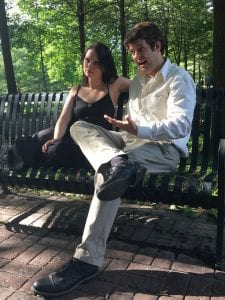
Jessica Taylor and Justin Marxen filming “Any Woman’s Blues.”
“The only thing we couldn’t get away from was being in the theater, so that’s why we cut the extras,” Taylor said, noting they kept distance inside. “There’s no more than four of us ever in there at a time.”
“Outdoors, we’re closer since there’s good air flow, but inside we did a dinner scene, where we were six to feet away from each other,” she said. “You couldn’t tell, there was a table between us. It looks like we’re closer together.”
“It was a strange experience…not what we’d normally do when we’re shooting,” Taylor said.
Despite her impressive stage career, she’d done little to no improvising before this.
“It was easier than I expected. But I was very, very nervous about it,” Taylor said. “We’ve all worked together before. It’s felt pretty natural so far.”
Marxen has worked with Taylor on “Sons & Daughters of Thunder,” among other films.
“It has been an honor to work with her and the rest of the actors in Ian’s film,” he said recently. “Everyone in the cast is so awesome and putting their heart and souls into the movie. Ian is a great director and a great friend and I have always loved working with him.”
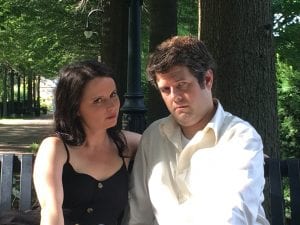
Jessica Taylor and Justin Marxen.
“Ian and I have been making movies for a long time and it has been a blast to work with him and the cast in this project,” Marxen said. “Ian and the rest of the actors and myself were fortunate enough to have the time to rehearse and talk about the characters and the story for a few months before we started filming. And because the film is all improvised, it helped out a lot.”
He got to be in “Complete Bull” (as was Tapscott), and Marxen said everyone on that shoot ensured things were done safely.
“There was a medic there to take your temperature and when you are not filming, you have a mask,” he said. “It was a very professional cast and crew.”
Marxen works full-time at Hy-Vee in Davenport and when the pandemic started, work was very busy. “But all of the customers were very nice and understanding,” he said. “When these films came up, Hy-Vee was very kind enough to give me time off for filming. I have been very fortunate enough to have a day job that has given me the time off to act in films and still give me good hours.”
Klink got the film bug early
Klink is a 35-year-old native of Camanche, Iowa, and grew up in several cities along the river in Iowa. A huge fan of “Ghostbusters” from age 3 (watching it four times a day), he said recently he wanted to make movies since he was 5.
After graduating in 2003 from North Scott High School in Eldridge, Klink earned his bachelor’s in communication from Aurora (Ill.) University and his master’s in film and television from Savannah College of Art and Design in Georgia.
As a filmmaker and artist, he has directed films and theater (many throughout the Q-C area), including his thesis film adaption of Stephen King’s “The Man Who Would Not Shake Hands” (in Savannah) and recently “No Exit” on stage.

Bryan Woods, left, and Scott Beck
Klink has been longtime friends with Scott Beck and Bryan Woods (screenwriters of 2018’s “A Quiet Place”), who are the same age and graduated from Bettendorf High. In high school, Beck and Woods were production assistants and Klink was acting in the independent film, “Iowa Boys.” Klink played the town drunk in Beck and Woods’ “Impulse” (2010).
“It’s so surreal; I remember this moment, where we’re sitting doing a scene in my house in Bettendorf, and it’s literally me, Justin, Scott and Bryan crowded in this small little bathroom,” Klink said of the summer after high school. “All of a sudden, I’m thinking of that while in my theater in Middletown, Delaware, watching ‘A Quiet Place’ on the big screen. It’s just such a surreal, meta moment.”
“Those guys have earned it,” he said of Beck/Woods. “They have worked so hard to get where they’re at.” They filmed answers to student questions (at Klink’s school) last year regarding “A Quiet Place,” which grossed over $340 million worldwide.
“Those guys are totally amazing at what they’re doing,” he said. “A Quiet Place Part II” (which didn’t involve Beck and Woods) had its world premiere in New York City on March 8, 2020. The film is scheduled to be released in theaters on April 23, 2021. Paramount initially planned to release it in March (then September 2020), but postponed it due to the ongoing Covid pandemic.
Klink got permission from Stephen King’s office to adapt his short story, “The Man Who Would Not Shake Hands” (1982). “It was a wonderful experience,” Klink said of his 18-minute film. In the story, a man killed someone in India, had a curse put on him and anyone’s hand he touches, they’ll die. He gets invited to a club to play poker, and he literally rubs people the wrong way.
“Stephen King offers this amazing deal, called ‘dollar babies,’ if you pay a dollar, he’ll give you the rights if you’re a student filmmaker,” Klink said. He still uses his film for his students, to show how to adapt a story.
Among his other film role models are George Romero, Stanley Kubrick and John Carpenter.
After grad school, he spent several years as a residence hall director at Aurora University and back at Savannah. Klink has taught in Delaware for three years.

Ian Klink
“I constantly come back to the Quad-Cities and visit and have a lot of filmmaking friends, and actors,” he said. “I’ve come back to make films.”
In April, with some of his Q-C friends (and from SCAD), Klink put together a two-minute film for Roger Corman’s Quarantine Film Festival. He asked all his actors to record themselves from home, and Klink edited them together.
“What was great, some of the first people I always show projects to are Scott and Bryan,” Klink said. “They gave me some notes. We stay connected, want to see each other’s projects, what we’re doing.”
“As a teacher, it was also great since I could say, I did this all from my house,” he said. “I didn’t have to go outside; we were in quarantine. You can make a movie as long as you know the tools, how to do it and you get awesome actors to work with.”
For the current film, Klink developed the story with his actors.
“Can we do this with everything going on?” he said of Covid. “The safest way is basically limiting how many people are on the set. I’m doing the camera work, I’m directing them at the same time.”
“It’s been a very independent, very low-budget movie,” he said, noting it will run about 75 minutes. “Through the process, I knew everyone was in the Quad-Cities; I had the summer off, being a teacher.”
Klink has partnered with the actors in coming up with dialogue and how to shoot. “With the pandemic and everything, I want them to be comfortable and safe. I’ll do my best to ask, do you want to limit the set, only have a certain amount of people, be a certain distance apart? Every time, they’ll guide me where they want me to be.”
“In order for this to work, they have to be comfortable with it,” he said.
“A wild time to be in show business”
Like others, Tapscott is grateful to have these creative outlets to stretch his acting muscles during this long-dormant period.
“It’s a wild time to be in show business,” he said. “On the one hand, you have nothing lined up and that’s scary as hell. On the other hand, you have nothing lined up so you’re completely open to any opportunity that comes your way.

QuadCities.com is leading the way in providing a platform for local and regional filmmakers.
“While my stage career has been put on an indefinite hiatus, I am finding some luck on the big and little screen,” he said. “I am thankful these two projects came along when they did. Had I been contracted as I was with theater gigs, there’s a chance I would’ve had to decline these two offers. For me, the open schedule has allowed me to pursue these kind of adventures. It’s important for my sanity to stay active and still be able to call myself an actor.
“Yes, I’ve created opportunities for myself during the pandemic, but the two films I’ve shot and the television pilot I’ve worked on were not things I dreamt up,” Tapscott said. “Sometimes it’s nice to be part of someone else’s circus. You can sit back and just be an actor and enjoy that. I love watching things come together on a set and I’m consistently inspired on how it all works. It’s true teamwork.”
“It’s a weird time for all of us, but it’s been nice to reflect on what it is I want to do and because of the open availability, the possibilities are endless,” he said.
Tapscott is leading an effort to get independent filmmakers to show their new work in a new “virtual cinema” at QuadCities.com.
“There are a number of local filmmakers in the Quad-Cities and surrounding area and there’s really no place to feature their work,” he said. “There’s no platform for it. How we view and experience art is changing rapidly and I want QuadCities.com to be an integral part of that shift. We have all of these independent films being shot with no showcase, and I want to change that.
“These people have worked hard and I want to be sure they get to show their stuff off,” Tapscott said. Area filmmakers can contact him to have their work featured, at tristan@tristantapscott.com.









